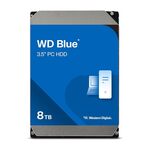Not as good /Tb as the recent 24Tb deal, but a decent price if you are looking for a modest size and appreciate a CMR drive. Not 7200RPM but I'm putting this in my HTPC so looking for a quiet drive.
WD Blue Internal Hard Drive 8TB CMR 3.5-Inch SATA 5640 RPM 256MB Cache $199.39 Delivered @ Amazon Japan via AU
Last edited 23/05/2025 - 21:50 by 1 other user
 CamelCamelCamel.
CamelCamelCamel.Related Stores
closed Comments

Why?

CMR > SMR, my dude

Pls share real-world-experience for basic storing & back-up, NOT continuous use such as RAID & NAS.
Reliability is more important than speed & considering WD desktop 8Tb: Mybook / Elements, thanks

@ab c: CMR is more reliable. It doesn't matter what you use it for. If you want cheap high capacity with compromises inherent in the design, then choose SMR.

@[Deactivated]: Comparing 3.5" WD-Blue-internal-HD to WD-desktop-8Tb: Mybook / Elements,
1.ALL are they CMR, right?
2.This 3.5" WD-Blue is the same internal-HD as above, but without 'a case, power-pack & software', right?
Thanks again. https://www.amazon.com.au/Desktop-Password-Protection-Backup…, https://www.amazon.com.au/Elements-Desktop-External-Hard-Dri…?

He loves suffering

lol id rather not

Great for a low cost media server where maximum performance or capacity is not the goal. Relatively quiet, cool and low power consumption.

So good for mostly data storage? Also assuming CMR is better than SMR right?

Recently, a new technique for increasing write density called "Shingled Magnetic Recording" (or SMR) has emerged. SMR drives write data using a special method that partially overwrites previously written tracks on a hard disk platter. The manufacturers use the analogy of roof shingles that partially overlap each other to explain this technique, which is where the "shingled" part of the name comes from.
While SMR drives increase capacity for lower cost (because the drives can use fewer platters than a CMR drive at the same capacity), the way they work also comes with a speed penalty. When you copy data to an SMR drive, the drive temporarily stores the data in a special cache area and uses idle time later to organize it into shingled regions on the platter. Long, sustained writes suffer speed penalties because if the cache fills up, each time an SMR drive overwrites part of a previous track, it must read and re-write the "partially covered" underlying data as well. So SMR drives can perform dramatically slower than CMR drives.

Especially in a RAID, replacing a disk and rebuilding an array with SMR drives is as big a sustained write as you will get, exactly when you least want it.

Reliability wise, how does it compare to WD-desktop-8Tb, https://www.networkhardwares.com/en-au/products/my-book-8tb-…?

It doesn't - you can't compare individual drive models in this way.
If one has a 4% failure rate and the other has a 3% failure rate, then … what are you going to do with that information ?? It's a pointless statistic.
All drives fail eventually.

Ship from Japan or local?

Computer noob here, should I pair this with my 8tb ironwood in nas as raid 0?

you aren't a complete computer noob if you know what raid is

Haha thanks, but that’s about where my limit is!

RAID 0 (stripe) in a NAS is almost never a good idea. With multiple disks it increases your chance of data loss: if any disk fails you lose the whole RAID.
With two equal size disks, RAID 1 (mirror) is what you're looking for.

@5kbjvb3o: I had a synology ds220j, it was slow as fk so I yolod and put it on raid 0….still slow as fk

@5kbjvb3o: Hey thanks that is exactly what I meant, exact copies of each other so I have one chance for disk error and change over..
I (not so) proudly stand corrected with computer noob statement..

thanks op

Just wanted to know, is this good for upgrading NVR?

Not terrible, but not great.
The NAS version of this drive has been ~$237 before.
https://www.ozbargain.com.au/node/857291
Would recommend for the usual SMART/NAS specs, but in general WD are pretty good these days.
Got one of these for my gaming PC, no complaints. Just waiting for the Red Plus to go on sale so I can use it for a NAS build.





5640 RPM , hahaha